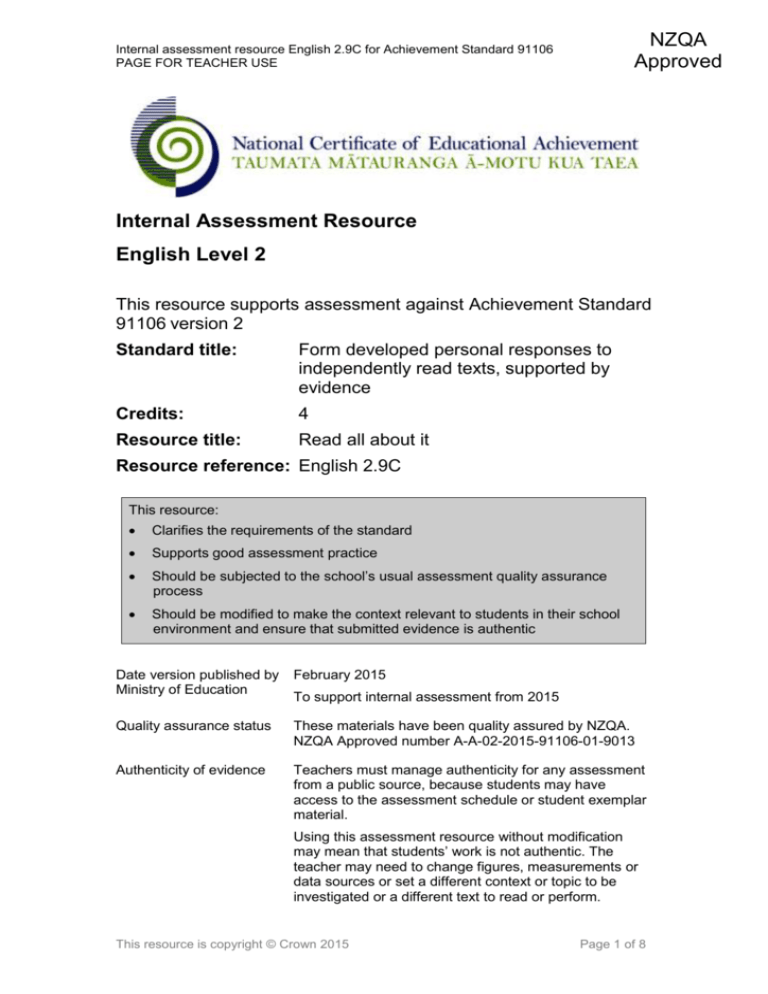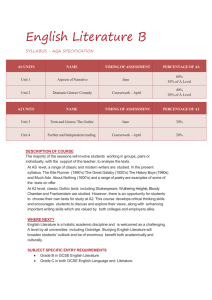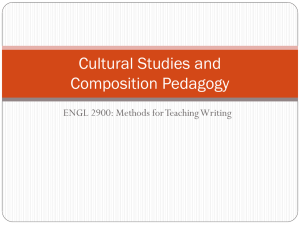2.9 C - NCEA on TKI
advertisement

NZQA Approved Internal assessment resource English 2.9C for Achievement Standard 91106 PAGE FOR TEACHER USE Internal Assessment Resource English Level 2 This resource supports assessment against Achievement Standard 91106 version 2 Standard title: Form developed personal responses to independently read texts, supported by evidence Credits: 4 Resource title: Read all about it Resource reference: English 2.9C This resource: Clarifies the requirements of the standard Supports good assessment practice Should be subjected to the school’s usual assessment quality assurance process Should be modified to make the context relevant to students in their school environment and ensure that submitted evidence is authentic Date version published by Ministry of Education February 2015 Quality assurance status These materials have been quality assured by NZQA. NZQA Approved number A-A-02-2015-91106-01-9013 Authenticity of evidence Teachers must manage authenticity for any assessment from a public source, because students may have access to the assessment schedule or student exemplar material. To support internal assessment from 2015 Using this assessment resource without modification may mean that students’ work is not authentic. The teacher may need to change figures, measurements or data sources or set a different context or topic to be investigated or a different text to read or perform. This resource is copyright © Crown 2015 Page 1 of 8 Internal assessment resource English 2.9C for Achievement Standard 91106 PAGE FOR TEACHER USE Internal Assessment Resource Achievement standard: 91106 Standard title: Form developed personal responses to independently read texts, supported by evidence Credits: 4 Resource title: Read all about it Resource reference: English 2.9C Teacher guidelines The following guidelines are supplied to enable teachers to carry out valid and consistent assessment using this internal assessment resource. Teachers need to be very familiar with the outcome being assessed by the achievement standard. The achievement criteria and the explanatory notes contain information, definitions, and requirements that are crucial when interpreting the standard and assessing students against it. Context/setting This assessment activity requires students to form perceptive, developed personal responses to six independently selected and read texts about sport and people who play and/or watch sport. Each response must be supported with specific evidence from the text. Conditions Students select their own texts. Teachers should schedule regular checkpoints to ensure authenticity of each student’s work. Resource requirements A text list with a wide variety of texts about sports may be provided. All texts must be at curriculum level 7 or above. Additional information None. This resource is copyright © Crown 2015 Page 2 of 8 Internal assessment resource English 2.9C for Achievement Standard 91106 PAGE FOR STUDENT USE Internal Assessment Resource Achievement standard: 91106 Standard title: Form developed personal responses to independently read texts, supported by evidence Credits: 4 Resource title: Read all about it Resource reference: English 2.9C Student instructions Introduction This assessment activity requires you to form developed personal responses to six independently selected and read texts about sport. Your responses will be supported by evidence from the texts. You are going to be assessed on how perceptively you form developed responses to six texts. This will be shown in the way you engage with your chosen texts and how you demonstrate insight in your responses. You need to use carefully selected evidence from each text. The following instructions provide you with a way to structure your work to demonstrate what you have learnt and allow you to achieve success in this standard. Teacher note: It is expected that the teacher will read the student instructions and modify them if necessary to suit their students. Task Selecting your texts You need to select six texts. At least four of the texts you choose must be written, two of which must be extended texts, such as novels or biographies. The remaining two texts can be visual, oral or written. You should choose texts which have challenged your thinking, extended your knowledge or made you think differently about an aspect of sport. While your teacher may make some suggestions for texts you may wish to read, it is your responsibility to select and read each of the six texts yourself. You cannot use any texts that are part of your required course reading. Possible texts include: novels, graphic novels, biographies, autobiographies, films, dramas, short stories, poetry, short films, song lyrics, blogs, feature magazine articles, or extended newspaper columns. See Resource A for some suggestions to get you started. For example, one student decided to watch ‘Million Dollar Baby’ and then read the biography ‘Solo’. He found an article about problems in sport on the internet, (‘A Look at the Problems in Sports today’ by Jack Anderson, http://bleacherreport.com/articles/24168-a-look-at-theproblems-in-sports-today) and used that for his third response. So this student needs to now read one more extended written text and one more short written text. His sixth text can be written, oral or visual. This resource is copyright © Crown 2015 Page 3 of 8 Internal assessment resource English 2.9C for Achievement Standard 91106 PAGE FOR STUDENT USE Check your text selection with your teacher to make sure that they are all suitable for this curriculum level. Preparing responses to your texts In negotiation with your teacher, you can choose the format to present these responses. This could take the form of: an oral presentation an essay a group discussion with the assessor a portfolio a mix of these types, i.e. some could be oral, some could be written any other method of presentation agreed by you and your teacher. When preparing your responses to your six texts, you could think about some of the following: discussing what you learnt about leadership/ coaching/team work/ managing self from the key characters in a short story, biography or novel you read discussing the consequences and or impact of some of the actions that sportspeople have made in a text you have read discussing your reaction to a sporting event in a text discussing how a text reflected or changed your personal view about a sport discussing how what you learnt in a text about the responsibilities of both individuals and organisations involved in sport affected or changed your attitude/behaviour discussing why people involved or interested in sport would find this text of interest or value. Make sure that you support your responses with relevant examples from the texts themselves. Complete and submit your six responses for assessment as you complete them throughout the year. This resource is copyright © Crown 2015 Page 4 of 8 Internal assessment resource English 2.9C for Achievement Standard 91106 PAGE FOR STUDENT USE Resources Resource A: Some text suggestions to get you started You might choose a biography or autobiography as one of your extended texts. For example: Valerie: The Autobiography by Valerie Adams Jonah: my story by Jonah Lomu The Open Side by Greg McGee and Richie McCaw Assault on Lake Casitas by Brad Alan Lewis Solo by Vicki McAuley To find a biography about a particular sportsperson go to http://search.aucklandlibraries.govt.nz/?q=sports. Click on ‘book’ then ‘person’. You might choose a book that gives useful advice for people involved in sport. For example: The complete guide to food for sports performance: a guide to peak nutrition for your sport by Louise Burke Sports Injuries: Causes, Diagnosis, Treatment and Prevention by Stephen R. Bird, Neil Black, Philip Newton Strength and conditioning for team sports: sport-specific physical preparation for high performance by Paul Gamble Sports coaching concepts: a framework for coaches’ behaviour by John Lyle. You might select a book that has chapters about different sports people or types of sport. One of these chapters would count as a short text. For example: Profiles of fame: the stories of New Zealand’s greatest sports achievers by Ron Palenski Sports, Extreme Sports by Matt Roper My sports hero: famous New Zealanders talk about people who inspired them by Wynne Gray You might choose an article from a magazine, newspaper or internet site as a short text. For example: Sports scandals: Going the distance by Paul Thomas. The Listener, 28th February , 2013 A Look at the Problems in Sports today by Jack Anderson May 19, 2008 http://bleacherreport.com/articles/24168-a-look-at-the-problems-in-sports-today You might choose a feature film as a visual text. For example: Coach Carter, directed by Thomas Carter Million Dollar baby, directed by Clint Eastwood For a list of movies about sport go to http://www.sportsinmovies.com/best-movies/best-sportsmovies.asp You might choose a sports documentary. For example: The Endless Summer (about surfing) http://topdocumentaryfilms.com/the-endless-summer/ Dare to Dream: The Story of the U.S Women's Soccer Team http://www.sportsinmovies.com/documentary.asp?mov=5 For a list of documentaries go to http://topdocumentaryfilms.com/category/sports/ http://www.sportsinmovies.com/list-sports-documentaries.asp This resource is copyright © Crown 2015 Page 5 of 8 Internal assessment resource English 2.9C for Achievement Standard 91106 PAGE FOR STUDENT USE You might choose to listen to a radio programme or podcast as an oral text. For example: Black Caps: Still International players? Insight, 3 March 2013 http://www.radionz.co.nz/national/programmes/insight/20130303 Summer sport: canoe polo http://www.radionz.co.nz/national/programmes/summernights To see what is available from national radio go to: http://www.radionz.co.nz/podcasts This resource is copyright © Crown 2015 Page 6 of 8 Internal assessment resource English 2.9C for Achievement Standard 91106 PAGE FOR TEACHER USE Assessment schedule: English 91106 – Read all about it Evidence/Judgements for Achievement Evidence/Judgements for Achievement with Merit Evidence/Judgements for Achievement with Excellence The student forms developed personal responses to independently read sports texts, supported by evidence by: The student forms developed convincing personal responses to independently read sports texts, supported by evidence by: The student forms developed perceptive personal responses to independently read sports texts, supported by evidence by: self-selecting and reading or viewing at least six texts about sport self-selecting and reading or viewing at least six texts about sport self-selecting and reading or viewing at least six texts about sport including at least four written texts, two of which are extended, e.g. novels, biographies including no more than two visual or oral texts including at least four written texts, two of which are extended, e.g. novels, biographies including no more than two visual or oral texts including at least four written texts, two of which are extended, e.g. novels, biographies including no more than two visual or oral texts demonstrating personal understandings of, engagement with, and/or viewpoints on the text supporting each developed response with evidence (either quotations or specific details) that is directly relevant to the text demonstrating significant personal understandings and expressing viewpoints on the texts that are reasoned and clear demonstrating personal understandings and expressing viewpoints on the texts that are insightful and/or original supporting each developed response with evidence (either quotations or specific details) that is directly relevant to the text supporting each developed response with evidence (either quotations or specific details) that is directly relevant to the text The student responds to links between the texts and themselves, and/or between the texts and the world, such as connections with knowledge, experience, ideas, and imagination from social, cultural, literary, political, or historical contexts. For example: After reading an article about the use of drugs in sport called ‘A look at the problems in sport today’, the student demonstrates a developed personal understanding about the pressures that contribute to the taking of steroids to enhance sporting performance: I was quite surprised when the writer said “Today’s athletes are spoiled, selfish prima donnas solely focused on the next endorsement or payday” but then I realised that I was being made to think about why so many athletes get caught up in this mess, that they will do anything to keep at the top. The student develops his ideas by reflecting on the consequences of this for young people at This resource is copyright © Crown 2015 The student responds to links between the texts and themselves, and/or between the texts and the world, such as connections with knowledge, experience, ideas, and imagination from social, cultural, literary, political, or historical contexts. The student responds to links between the texts and themselves, and/or between the texts and the world, such as connections with knowledge, experience, ideas, and imagination from social, cultural, literary, political, or historical contexts. For example: For example: After watching the movie Million Dollar Baby, the student demonstrates a developed, convincing personal understanding about the relationship between Frankie and Maggie. The student engages both with the story and the issues it deals with, in particular euthanasia. The student shows awareness that the issue facing Frankie is not necessarily clear cut, and evidence from the text is integrated with personal viewpoint and opinion. … this movie made it all very real - because of the way the relationship had been developed (examples given). I could really feel the conflict between After reading a biography about a solo ocean voyage, the student demonstrates a developed, perceptive personal understanding about the responsibility of being a husband and father who is involved in a dangerous sport. The student engages with the text: Never before have I disagreed so strongly with an author's portrayal of a person. … [it], didn't make me feel admiration for the main character. In fact, it left me with an almost totally negative impression of him. I disagreed strongly with Vicki McAuley’s depiction of her husband as a faultless man. The student challenges the reader to Page 7 of 8 Internal assessment resource English 2.9C for Achievement Standard 91106 PAGE FOR TEACHER USE secondary school: the trouble is students who are ambitious will do what their heroes do, so if they do it, why can’t they? The examples above are indicative samples only. Frankie’s loyalty to Maggie and to his personal beliefs. But it also made me think about what happens to our beliefs and values when they are challenged by a real incident, such as this one. Although I enjoyed the movie because of the boxing scenes, it left me thinking more about what I would do in a situation like that. The examples above are indicative samples only. think beyond the usual admiration for this type of adventurer: The book’s never-ending descriptions of ‘brave’, ‘fearless’, ‘amazing’ Andrew irritated me. What sort of father puts his ambitions before his parental duties? What kind of man willingly and with full knowledge leaves his wife to pay a mortgage and tend to their son so that he can enjoy an adventure? The examples above are indicative samples only. Final grades will be decided using professional judgement based on a holistic examination of the evidence provided against the criteria in the Achievement Standard. This resource is copyright © Crown 2015 Page 8 of 8









